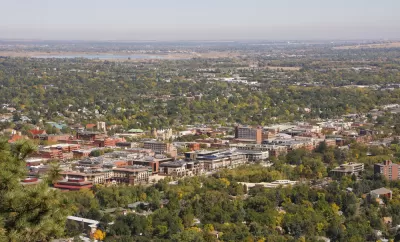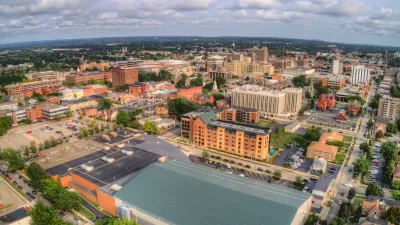From opportunity zone to 'opportunity-free zone.'

"[The] Boulder City Council voted 6-3 to temporarily ban development of office space and demolition of apartment buildings in a broad eastern swath of the city designated as a federal opportunity zone," reports Shay Castle.
The decision prompted a soundbite that could only happen in 2018. Councilmember Bob Yates, one of the votes against the moratorium had this to say in response to the final decision: "With this moratorium, we just turned an opportunity zone into an opportunity-free zone."
The moratorium is drafted to remain in place through June 2020. In the meantime, the city is working on completing zoning regulations to implement the recently completed Boulder Valley Comprehensive Plan. New zoning regulations could move up the expiration date of the moratorium.
Although it's not totally clear from the article, it's implied that the moratorium was approved out of concern over potential investments following incentives provided by the federal Opportunity Zone program. According to statements by Councilmember Sam Weaver, the comp plan prioritizes the preservation or retail, while increasing housing and curb office spaces.
The implication, then, is that the Opportunity Zone program places those goals at risk. The moratorium was thus drafted in "emergency." City Councilmember Jill Alder Grano had this to say about whether the term was warranted: "To call this an emergency, as a member of the public I lose a little faith….It's a terrible way to govern."
FULL STORY: 'Opportunity-free zone:' Council bans development, demolition in east Boulder

Alabama: Trump Terminates Settlements for Black Communities Harmed By Raw Sewage
Trump deemed the landmark civil rights agreement “illegal DEI and environmental justice policy.”

Planetizen Federal Action Tracker
A weekly monitor of how Trump’s orders and actions are impacting planners and planning in America.

Why Should We Subsidize Public Transportation?
Many public transit agencies face financial stress due to rising costs, declining fare revenue, and declining subsidies. Transit advocates must provide a strong business case for increasing public transit funding.

Understanding Road Diets
An explainer from Momentum highlights the advantages of reducing vehicle lanes in favor of more bike, transit, and pedestrian infrastructure.

New California Law Regulates Warehouse Pollution
A new law tightens building and emissions regulations for large distribution warehouses to mitigate air pollution and traffic in surrounding communities.

Phoenix Announces Opening Date for Light Rail Extension
The South Central extension will connect South Phoenix to downtown and other major hubs starting on June 7.
Urban Design for Planners 1: Software Tools
This six-course series explores essential urban design concepts using open source software and equips planners with the tools they need to participate fully in the urban design process.
Planning for Universal Design
Learn the tools for implementing Universal Design in planning regulations.
Caltrans
Smith Gee Studio
Institute for Housing and Urban Development Studies (IHS)
City of Grandview
Harvard GSD Executive Education
Toledo-Lucas County Plan Commissions
Salt Lake City
NYU Wagner Graduate School of Public Service





























